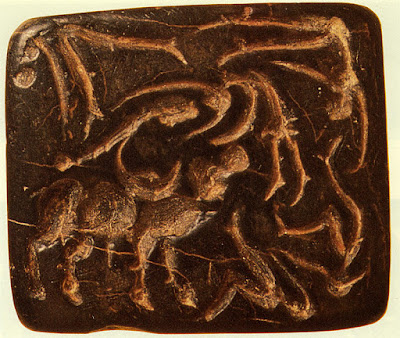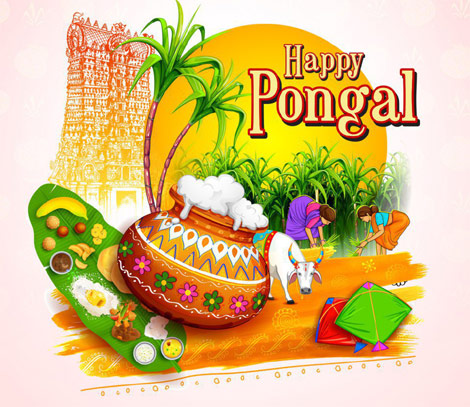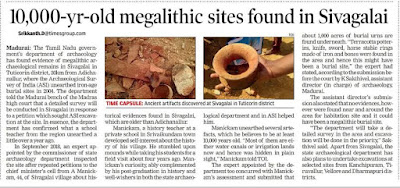Pongal - Oldest Harvest Festival in the World !!
Pongal is one of the Oldest harvest festival in the World, which is being celebrated for several thousand years. It is an ancient winter harvest festival of people in South India, particularly in Tamil Nadu. The history of this festival can be traced back to Sangam Age. Although, Pongal was originated as a Dravidian Harvest festival and it has been mentioned in Sanskrit Puranas and Tamil literatures. This post is all about History of Pongal festival, Why Pongal was prepared for this harvest festival and agricultural, harvest and celebration similarities across the ancient civilizations of the World.
To Know about the significance, multiple days of celebration and pooja procedure of Pongal festival, reach out to
https://divinediyaas.blogspot.com/2018/01/happy-pongal-makar-sankranti.html
Since this harvest festival falls in the month 'Thai' (10th month of tamil calendar, Makar - in Sanskrit), Historians identify this festival as 'Thai Un' and 'Thai Niradal' which are believed to have been celebrated during the Sangam Age. Thai Pongal which will be celebrated across Tamil Nadu in the month of January around 14, 15 16 (not fixed dates) as a thanks giving celebration to God Indra and Lord Surya for providing favorable climatic conditions for paddy cultivation. God Indra for providing good seed and moderate rain, God Surya for providing the required solar energy and warmth which resulted better yield of crops.
In addition to this harvest festival, Pongal is also prepared as prasadam for worshiping Kula Deivam / Kula Devata. Kula Deivam, is one family's Guradian Deity. Kulam / Kula - meaning lineage / clan, deivam / devata - meaning God. It is a strong belief among South Indians that worshiping kula deivam will save our family from all types of harms, evils and hindrances, and will also take care of our family. Every family will go together and visit their guardian deity at least once in an year and worship them by preparing 'Pongal' in the temple premises. Will pen down a separate detail post about Kula Deivam worship.
 |
| Pongal celebration at Temple |
In Some places, they also offer a portion of the yield by exhibiting Nellmudi and offer it to God Ayyanar. Ayyanar is Gramma devata, Village deity, he is worshiped for protecting the lands from all calamities.
Pongal Meaning
Pongal meaning 'Overflowing' / 'boil over', signifying overflowing prosperity and happiness in the family and society as it's the harvest season. Pongal is also celebrated as Makar Sankranthi and Uttarayan in other parts of India. 'Uttarayan' is six month period where the Sun travels towards North, starting on this day
Why Pongal is prepared for this festival??
Why Pongal has to be prepared for this harvest festival? Tamil Nadu is rich in Rice production. The delta region of Kaveri River is 'Thanjavur', also called as 'Rice Bowl of Tamil Nadu' and regions near Tamirabarani river were named after Rice. Agriculture was the main vocation of the Tamils, It was considered as a necessity for life, hence was treated as the foremost among all occupations. the farmers or the Uzhavars were placed right at the top of the social classification.
As Rice and Sugarcane would be harvested in this season (Thai), in order to express gratitude to Gods, part of freshly yielded rice was offered to them as Prasad. Instead of giving raw rice, it was prepared as Prasadham in the form of Pongal. In an Earthenware pot, the newly harvested rice was cooked in rich milk and water. Milk signifies prosperity and purity, as the milk overflows, let the yields also overflow in this harvest season. The pot with milk will be placed facing east direction to God Surya, once it boiled and overflows from the pot, all the people / family members will shout "Pongalo Pongal !! Pongalo Pongal !!".
In addition to Milk Pongal, Sweet Pongal will also be offered to God. For Sweet Pongal new rice and Moong Dal is cooked with milk and water, then Jaggery, ghee, nuts and cardamom will be added for sweetness and taste. Dal signifies Wealth, Jaggery signifies Happiness and ghee signifies Victory. This is the reason for the Pongal being prepared for the Harvest Festival, to offer some portions of the harvested yields to God in a sweet way. Along with Pongal, freshly harvested Sugarcane, Tumeric and Ginger plants are also kept as offer to Gods.

A special puja is performed on the first day of Pongal before the cutting of the paddy. Farmers worship the sun and the earth by applying sandal wood paste and turmeric on their ploughs and sickles. With these consecrated tools, the newly-harvested rice will be cut.
Ancient sites of Paddy Cultivation
In Porunarattrupadai -240-45, it is mentioned about the paddy cultivation in Tamizhalakam,
கூனி, குயத்தின் வாய் நெல் அரிந்து,
சூடு கோடாகப் பிறக்கி, நாள்தொறும்,
குன்று எனக் குவைஇய குன்றாக் குப்பை
கடுந் தெற்று மூடையின் இடம் கெடக் கிடக்கும்,
சாலி நெல்லின், சிறை கொள் வேலி,
ஆயிரம் விளையுட்டு ஆக,
காவிரி புரக்கும் நாடு கிழவோனே.
Meaning: Matured paddy which is about to ready for harvest in Kaveri delta region and talks about heap of yielded rice as Aayiram veli (Aayiram- one thousand, the measurement unit veli is unknown)
The famous ancient and megalithic site Adichanallur is situated near the river Tamirabharani in between a huge land of paddy cultivation. In addition to Thanjavur, Tamirabharani is also a prime source of paddy cultivation. Adichanallur (Adi - meaning a primitive, Nel - Paddy, oor - village), this site close to 'Korkai', the capital and port city of Early Pandya Kings. Tirunelveli is also closer to Adichanallur, which is named after Paddy cultivation as Thiru - Sacred, Nel - Paddy, Veli - fence. It was also called as Marutha Veli in earlier days. Historians believed that Marutha Veli was the capital of Early Pandya Kingdom before they sworn Madurai as capital during third Tamizh Sangam.
The Chief deity in Tirunelveli is Lord Nellaiyappar (Lord Shiva), he is named after paddy, as he believed to be protected farmer's rice crop over there. Nel - Rice, Appar - Father / Lord. As, this city is an ancient settlement of early Pandya kings, it is also called as 'TenPandya Nadu' / 'TenPandya Semmai'.

Paddy Cultivation in Tamizhakam dating back to.....
The places Adichanallur, Tirunelveli, Nellaiappar temple etc were named after rice and ruled by Early Pandya kings. Tools used for agriculture were also excavated from the site, Evidence of rice is seen in these megalithic sites such as Adichanallur and Porunthal site (near Pazhani). Before the cultivation of Paddy, Tamizh people had cultivated millets and lentils in abundance in Tamil Nadu, so agriculture is not new to Tamizh people.
Carbonised Paddy in a pot was unearthed from a place Agaram (near Keeladi) and Sivagalai in Thothukudi, by Archaeologists of Tamil Nadu. Sivagalai is ancient megalithic site, the artifacts unearthed from Sivagalai is believed to be 10,000 years old. The ancient sites Adichanallur and Sivagalai is considered as historical treasure of Ancient Tamizh Civilization.
Now, coming back to Pongal, in early records, Pongal is appeared as ponakam, tiruponakam, ponkal and similar terms. Pongal celebrations can be at least dated back to 3,000 years old as the proof proposes that there are inscriptions of detailed Pongal recipes mentioned in some Hindu temples of Chola period.
Chola Kings predominantly ruled the Thanjavur delta region, where the Rice crops were grown in abundance, there was a line mentioned in tamil literature that ' The harvested rice crops were arranged like several heaps. Each heaps will be a looking like a mountain through which even an elephant can hide'. So, Pongal festival was celebrated in much pomp and rigors during Chola period.
The inscriptions found in the renowned Lord Veeraraghava temple at Tiruvallur mentions that Chola King Kiluttunga had the practice of gifting land to the temple as part of the Pongal celebrations. The inscription of the Thiruvallur temple shows that on this day, a variety of donations were given to the poor by the Kilutunga king on this day.
From the ancient sites Adichanallur, Sivagalai, Thanjavur, Nellaiappar Temple, it is evident that Rice cultivation was flourished starting from Pandya Era. Then, it was continued by the consecutive rulers such as Cholas, Pandyas, Cheras, Pallavas, Velir Kings. Pongal has become like a part of Tamizh culture.
Tamizh kings have conquered at settled at various places in the World. Indus Valley sites are one of them, According to Archaeologists and researchers the prehistoric settlement of Indus valley people are connecting to Proto Dravidian people of South India. To know more the settlement of ancient Tamizh people at Indus region, reach out to
https://divinediyaas.blogspot.com/2020/12/kumari-kandam-part-5-pre-indus-valley.html
Now, there are some connections between Pongal celebration and its been celebrated in Pre Indus Valley civilization. Let us see one by one
In Connection With Indus Valley Civilization
The literary evidence of unknown early Pandya kingdom (Paddy based region) near Pakruli river in submerged Kumari Kandam and Kabadapuram have revealed a lot of interest and in sight on paddy culture. Recently Dr.A.Parpalo, Finland Indologist's research on Indus valley and Tamil script link is to be studied in terms of paddy culture.
Archaeological evidences such as the recent discovery in ancient Tamil paddy cultivation area (Sangam literature described as Maruda Nilam) Adichanallur, where the world's largest three-tier pre-historic cemetery is found is situated in oldest Tamirabarani river. Porundal is a traditional paddy cultivated area and the encouraging roots of Indus-valley civilization of Dravidian origin, said by Dr.A.Parpalo.
Another old grain sample came from Mohenjodaro of Pakistan and dates from about 2500 B.C. (Andrus and Mohammed 1958). By considering the above, the Indus-valley and the Tamil script root and Adichanallur findings have a possibility that ancient Tamil Nadu has a traditional paddy culture and it might have expanded to many places.
Also, As a part of Pongal celebration, Jallikattu - a sport of embracing bull will be held on second day of Pongal. This custom is being followed in South India for several thousand years, to preserve the native bulls (Naattu Maadu) and it's strength. This Jallikattu was also performed at ancient Indus Valley sites, which corresponds to Pre Indus Valley Civilization of Thamizh people in Sindhu region.
There are some seals unearthed from Banawali, an Indus Valley site. Below mentioned seal is one of them, Bull leaping form of non violent bull fighting seals and images were identified.
 |
| Bull leaping seal from Indus Valley Site |
 |
| Jallikattu in Tamil Nadu |
To know in detail about the importance and significance of Jallikattu / Eru Thazhuvudhal, reach out to
https://divinediyaas.blogspot.com/2018/01/jallikattu-importance-of-native-indian.html
நல்லேர் நடந்த நசைசால் விளைவயல் - Where fine bulls walked to plow the yielding field.
Wooden ploughs were used, deep ploughing is considered to be superior than shallow ploughing.
 |
| Bulls ploughing at Tamil Nadu |
Similar to Pongal, there are many Rice Harvest festivals celebrated across many places in the World, in a similar manner.
The Rice Harvest Festival that is held in Bali, Indonesia, is a feature of the Tamizh culture at Bali. The Bali's harvest festival and Pongal does not occur at the same time or month. Due to climatic conditions, they both occur at different months, but the rituals followed for the harvest festival, traditions and celebrations of these two harvest festival are very similar.
The Bali's harvest festival is dedicated to the rice goddess 'Dewi Sri' and is a time of joyous celebration. Effigies of the goddess are placed in the fields in thanks, towns are decorated with colored flags, and special bull races are held.
The local farmers would offer their great gratitude and praise for their abundant harvest of the year. This is similar to Pongal - Harvest festival of Tamil Nadu. This Tamizh culture influence at Indonesia is due to the past history of many Dravidian rulers such as Tamizh Pandya and Chola Kings. So, one could see the impact of Tamizh culture in Indonesia.
A famous part of this festival is the Negara Bull Races which are held at Perancak (place), where water buffaloes are decorated and raced along the streets. This is similar to the bull races held in South India, such as Jallikattu and Rekla race, Bail Gadi Shariat of Maharastra, Maramadi of Kerala and Kambala of Karnataka.
 |
| Bull Race at Indonesia |
Tamizh people have identified 'Wild Rice' and have abundant knowledge about it, this is also mentioned in poem of "Agananuru" , as 'Vittha Valci' - The rice that grown without being sown. Bali is strongly influenced by Hindu and Tamizh culture. Subak (Water Irrigation System) and Paddy cultivation in wet fields are taught by Tamizh Kings who have migrated and settled at Bali.
Evidence of wild rice on the island of Sulawesi dated to 3000 BC. Evidence for the such earliest cultivation, comes from eighth century stone inscriptions from the central island of Java, which show kings levied taxes in rice. The images of rice cultivation, rice barn, and mouse pest infesting a rice field is evident in Karmawibhangga bas-reliefs of Borobudur. Since, the paddy cultivation has spread from Tamizhakam to Bali, from the above evidences it can be said that agriculture in Tamil nadu was at least 5000 years before.
The type of plough technique used in ancient Thamizhakam was also used in Indonesia and ancient Egypt. Below picture depicts a farmer ploughing with bulls at Borobudur, Indonesia.
Mehregan is an Zoroastrian and Persian festival, celebrated to honour god Mithra. It also called as Persian autumn festival, The Mehr day in the Mehr month corresponded to the day farmers harvested their crops. They also celebrated the fact that Ahura Mazda had given them food to survive the coming cold months.
The autumn equinox marks the moment the Sun crosses the celestial equator – from north to south. This event is celebrated as Mehregan. They worship with the freshly harvested paddy, pulses, veggies and fruits.
 |
| Harvested yields kept for worship |
Thus, the harvest festival of Tamil Nadu is been celebrated across places in a similar way, by expressing gratitude to Gods with the harvested yields. This is proving the fact that Tamil culture is being followed in many places in the World, due to the settlement of ancient Tamizh people and rule of Pandya, Chera, Chola and Velir Kings in those places.
Celebration and Games during Pongal
As a part of Pongal celebration, there are Melas held along with races, games, dance ceremonies and fun activities are held, and the most powerful men who won the Jallikattu were chosen by the Kumaris (wannable brides) as their husbands. Temples and cultural centers organize the ritual cooking of Pongal dish, along with fairs (Pongal mela) with handicrafts, crafts, pottery, sarees, ethnic jewelry for sale.
These sites hold traditional community sports such as 'Uri Adithal' (breaking a hanging mud pot while blindfolded), Pallankuzhi, Kabbadi, Tug of War as well as group dance and music performances in major cities and villages.
Pongal is celebrated as 'Social festival', it is considered as a part of Tamizh culture. It is being celebrated for several thousand years and will continue to celebrate in future as well. The beautiful tradition of paying tribute to nature and worshiping them as Gods with much respect and love is conjoined with the belief of the people. All ancient civilizations in the World considered nature as Gods and worshiped them, Tamizh civilization is indeed one of them !!
Happy Pongal to all my readers !! Let the Health, Wealth, Knowledge, Prosperity, Happiness and Peace overflow in this World !!










Very interesting facts on the ages-old tamil culture & history. Thanks for your efforts in documenting the historical treasures of our country.
ReplyDeleteNice blog! Pongal is a thanks-giving festival celebrated throughout Southern India. To boost your pongal celebration 2022, here are the top pongal party games.
ReplyDeleteThank you, please share it with your friends.
ReplyDeleteTo know in detail about the importance and significance of Jallikattu / Eru Thazhuvudhal, reach out to
ReplyDeletehttps://divinediyaas.blogspot.com/2018/01/jallikattu-importance-of-native-indian.html